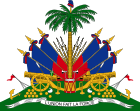President of Haiti
| President of the Republic of Haiti | |
|---|---|
| Président de la République d'Haïti ( Jean Jacques Dessalines | |
| Succession | Line of succession |
| Salary | 250,000 Gourdes per month[1] |
| Website | La Présidence |
 |
|---|
|
|
The president of Haiti (
Term and election
A number of qualifications for the presidency are specified by Chapter III, Section A (Articles 134 and 135) of the 1987 Constitution of Haiti.
The president is elected to a five-year term by popular vote. The president may not be elected to consecutive terms; he may serve a second term only after an interval of five years, and may not run for a third term.[A134]
To be elected president, a candidate must:[A135]
- be a native-born Haitian and never have renounced nationality;
- be 35 years old by election day;
- enjoy civil and political rights, and not have been sentenced to death, civil rights for a crime;[unreliable source?]
- be the owner of real property and have one's habitual residence in the country;
- reside in the country at least 5 years before election day;
- have been discharged of responsibilities if he previously handled public funds.
Elections are held on the last Sunday in November in the fifth year of a president's term. However, in actuality
Each presidential term is supposed to begin and end on the February 7 immediately following the last presidential election. However, this has not always been observed, as when Michel Martelly became president on May 11, 2011. [A134]
Duties and powers
Other qualifications for the presidency are specified by Articles 136 to 147, part of Chapter III, Section B of the 1987 Constitution. The president has no powers except those accorded to him in the Constitution.[A150]
The Constitution mandates that the president see to:
- respect for and enforcement of the Constitution and the stability of government institutions;
- regular operations of public entities;
- the continuity of the State;[A136]; and
- the nation's independence and the integrity of its territory.[A138]
When there exists a majority in
The president
With the approval of the
With the approval of the Council of Ministers, the president appoints the directors-general of the civil service, as well as delegates and vice-delegates of various departments and arrondissements. [A142]
The president ratifies laws, and has the right to choose between ratifying a law or not. [A144]
The president may reduce or commute sentences in all res judicata cases, except ones imposed by Supreme Court judges. The president, however, may not grant amnesty to non-political prisoners.[A146][1]
Residence
The
Line of succession
Under the 1987 Constitution, the presidential
Latest election
See also
- List of heads of state of Haiti
- Vice President of Haiti
- Prime Minister of Haiti
- List of prime ministers of Haiti
Notes
^ [A___] citations are Article numbers of the 1987 Constitution of the Republic of Haiti. A government-issued but unofficial (and error-prone) English translation is available at http://www.unhcr.org/refworld/docid/3ae6b542c.html and http://pdba.georgetown.edu/Constitutions/Haiti/haiti1987.html and the French original is available at http://pdba.georgetown.edu/Constitutions/Haiti/haiti1987fr.html
References
- ^ NEWS, HAITIZ. "Le Chef de l'État n'a que 250 mille gourdes le mois". www.haitiz.com.
- ^ "Haiti PM vows to work to hold elections 'as quickly as possible'". Al-Jazeera. 28 July 2021. Retrieved 28 August 2021.
- ^ Kurmanaev, Anatoly (4 August 2021). "Assassination Mastermind May Still Be at Large, Haiti's Caretaker Leader Says". The New York Times. Retrieved 28 August 2021.
- ^ Wilentz, Amy (23 July 2021). "The Best Haitians Can Expect From Prime Minister Ariel Henry". The Nation. Retrieved 25 July 2021.
- ^ "With Ariel Henry installed as Prime Minister, tensions in Haiti continue to simmer". Global Americans. 23 July 2021. Retrieved 25 July 2021.
- ^ Reimann, Nicholas (23 July 2021). "Gunfire Erupts At Funeral Of Slain Haitian President Jovenel Moïse, Report Says". Forbes. Retrieved 25 July 2021.
- ^ "Haiti Manifestation : Big conflict in Pelerin 5 where President Jovenel Moise lives".
Sources
- Schutt-Ainé, Patricia (1994). Haiti: A Basic Reference Book. Miami, Florida: Librairie Au Service de la Culture. p. 165. ISBN 0-9638599-0-0.
